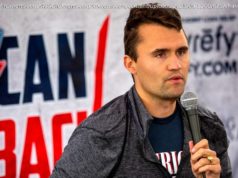Attorney General Jeff Sessions is the Cabinet member who’s borne the brunt of President Donald Trump’s criticism over the past year. Blamed by the President as the origin of the special counsel’s Russia probe, Sessions has been on the end of Twitter barbs and private dress-downs alike. The «beleaguered» attorney general — as the President has called him — even offered to resign after heated exchanges, sources told
«It is the honor of a lifetime to serve as the attorney general of the United States,» Sessions told his former Senate colleagues in an October hearing. It’s also been a year not short of controversy.
Here are the key developments from the 2017 Department of Justice (outside of special counsel Robert Mueller’s probe into Russian election meddling):
Crime and punishment
It’s a theme the attorney general emphasizes regularly in speeches across the country: A recent uptick in the national rate of violent crime is not a «blip.» Since assuming the role of the nation’s top law enforcement officer, Sessions has taken aim at rising crime, bringing the key thrust of his tenure on tour. In visits to more than a third of the nation’s 93 US attorney’s offices, he’s sat with the families of victims and praised local police and prosecutors. He’s also regularly used stark rhetoric and grisly descriptions to sound the alarm, such as a young father in Toledo who was «beaten to death in front of his four-year-old» and Memphis families who «live every day as hostages.»
Indeed, the 3.4 percent increase in the US violent crime rate between 2015 and 2016 was the largest single-year jump in 25 years, according to the latest FBI statistics. While critics of the administration are quick to point out that today’s rate remains drastically lower than past peaks, an upward trend is apparent: The US homicide rate increased by nearly 8 percent last year, driving an increase of violent crime in the country for the second year in a row.
Sessions has fought back with a targeted law enforcement approach. In an October memo, he directed all US attorneys to implement new violent crime reduction strategies as part of the renewed DOJ program Project Safe Neighborhoods. The «centerpiece of our crime reduction strategy,» as Sessions has called it, Project Safe Neighborhoods emphasizes data collection and focused policing of the worst criminal offenders. To bolster the program, Sessions announced in December the addition of 40 new assistant US attorneys to hard-hit districts across the country. Sessions has also called for prioritized firearm prosecutions, leading to a nearly 23 percent increase in the cases from 2016 to 2017, the DOJ said in July.
As he’s beefed up law enforcement tools, Sessions has extended the «law and order» administration to the courtroom, raising hackles from criminal justice advocates. In late December, Sessions announced the repeal of a guidance document that cautioned judges against the burdensome enforcement of fines for indigent criminal offenders. And in May, Sessions told prosecutors to «charge and pursue the most serious, readily provable offense» against criminal suspects, upending an Obama era push to phase out long prison sentences for non-violent drug offenders.
«The Trump administration is returning to archaic and deeply-flawed policies,» Inimai Chettiar, the director of the Brennan Center’s Justice Program, said at the time.
Sessions has also brought attention to the country’s opioid crisis to the forefront of the DOJ in 2017. «We know that drugs and crime go hand in hand. They just do, the facts prove that so,» he often says in speeches.
In the closing months of 2017, Sessions launched task forces and funneled millions in new grant funding to disrupt the manufacturing and distribution of illegal opioids in the US and abroad. Though an outspoken critic of marijuana — he once called the drug «only slightly less awful» than heroin — Sessions has not so far issued federal policy to slow the growth in its legalized cultivation and sale across the country.
Immigration
The divisive issue of immigration in the country has made its way into the front of discussions of national security in Sessions’ DOJ. While not mainstream political targets under the last administration, immigration flashpoints like MS-13 and sanctuary cities have earned large shares of fire from Sessions’ DOJ.
MS-13, the first street gang to be labeled a transnational criminal organization by the government, has earned outsized focus this year. Known as an especially violent gang, the group is smaller than other gangs in the country, and experts have called Sessions’ attention to it lopsided. In visits this year to Long Island, New York, where the gang is blamed for several murders, and to El Salvador, where its leaders are based, Sessions has spotlighted the gang’s brutality and cross-border connections, often calling for ramped up border security in the same breath. In October, Sessions designated the gang a priority for enforcement by specialized drug task forces, and in November, the DOJ in coordination with US Immigration and Customs Enforcement announced the arrest of 214 gang members across the country.
Sessions also raised eyebrows this month when he joined the Homeland Security secretary to pin blame on immigration policies for allowing two terror suspects into the country. «As yesterday’s events showed us in the starkest terms: the failures of our immigration system are a national security issue» Sessions said in Baltimore, the day after a 27-year-old green card holder originally from Bangladesh attempted to explode a device in the New York City subway.
The suspect, Akayed Ullah, came to the US from Bangladesh in 2011 on a visa for children of siblings of US citizens, DHS has said. Criminal charging documents for Ullah, however, indicate federal authorities traced the beginning of his radicalization to «at least approximately 2014» — three years after he came to the United States.
Sanctuary cities too have become a particular bogeyman for the administration. Trump first seized on the issue in the campaign after the death of Kate Steinle, a San Francisco woman who authorities say was shot by an undocumented immigrant who had been previously released from jail under the city’s detention policies. In a round of letters sent last month, the DOJ threatened to withhold certain grants from jurisdictions it considers to be sanctuary cities — areas that limit cooperation with immigration officials to detain individuals. Similar measures have faced trouble in the courts, though, as some of the country’s biggest cities, led by liberal mayors like Chicago’s Rahm Emanuel, have pushed back. Attempts by the DOJ to force local police to comply with federal requests also may contrast the partnership approach taken in crime reduction efforts.
The DOJ has sought in court — with mixed success — to salvage another of the President’s signature agenda items: the travel ban. Now on its third iteration, the ban on travel from eight nations, considered a Muslim ban by critics, is currently underway after a Supreme Court order this month allowed its enforcement while challenges to the merits continue to make their way through the legal system.
Civil rights
Sessions advocates for following «the law as written,» noting that it is «what our Constitution demands» in an October speech at the Heritage Foundation. This strict reading of the Constitution has prompted Sessions’ DOJ to roll back some of the guidance concerning civil rights the Obama Administration had previously issued. Sessions explained this end of regulation by guidance, saying the DOJ «will not use guidance documents to circumvent the rulemaking process, and we will proactively work to rescind existing guidance that goes too far.» This has also led to the DOJ’s vigorous defense of religious liberty.
Transgender rights have been front and center in the push and pull of Sessions’ DOJ. Sessions has directed his Civil Rights Division to crack down on hate crimes, including against transgender victims, and sent one of its top civil rights attorneys to Iowa in October to help convict a man charged with killing a transgender teen last year.
But that move came in the wake of the withdrawal of several DOJ directives that appeared to lessen protections for transgender people. In February, the Justice Department withdrew guidance from Obama-era Attorney General Loretta Lynch which had instructed schools receiving federal funds that they must not discriminate against a student based on gender identity. The rollback means public schools are no longer obligated to allow transgender students to use bathrooms that correspond with their gender identity. Further, in October, Sessions formally determined that a 1964 federal civil rights law, Title VII, does not protect transgender workers from employment discrimination, once again upending previous guidelines issued under Obama.
Домой
United States
USA — Science Sessions' 2017 agenda at DOJ reflects Trump's, despite rocky relationship






